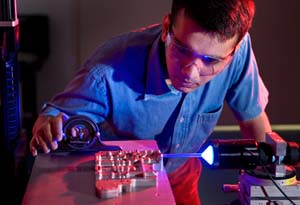General Motors has received more clean-energy patents in the past year than any other organization, according to a new study.
New data from the Clean Energy Patent Growth Index of U.S. patents released Friday indicated GM’s 135 patents represent nearly 14% of the total 1,881 received by 700 organizations around the United States, which isn’t too bad for a “clueless, lumbering giant,” as some have dubbed the maker.
“U.S. clean-energy patents were at an all-time high in 2010,” said Victor Cardona, co-chairman of the Cleantech Group, at the Albany, N.Y., law firm of Heslin Rothenberg Farley & Mesiti, which specializes in intellectual property and publishes the Index.
“GM has clearly put forth a lot of effort in a range of clean-energy technologies, resulting in its appearance at the top of the list for the first time,” he said.
GM’s patents covered hybrid electric vehicles, fuel cells and solar energy, and focus on improvements to current and future technologies.
The list of patents covered areas such a multi-injection combustion cycle systems for spark ignition direct injection engines, a dynamically adaptive method for determining a battery’s state ofcharge, an electrically variable transmission with three planetary gear sets with two fixed interconnections, a variable active fuel management delay with hybrid start-stop and the control of hybrid power regeneration and an operating method for a plug-in hybrid electric vehicle, GM officials said.
“GM is on a journey to reinvent the automotive DNA, and that’s driving a great amount of innovation and technological breakthroughs,” said Alan Taub, GM vice president of global research and development.
GM received 940 U.S. patents overall in 2010, placing it in the top 25 of all companies. This includes sectors such as information technology and consumer electronics.
The Clean Energy Patent Growth Index tracks the granting of U.S. patents in solar, wind, hybrid/electric vehicles, fuel cells, hydroelectric, tidal/wave, geothermal, biomass/biofuels and clean, renewable energy.
“Strong companies today are driven by a culture of innovation fueled by a continued commitment to R&D investment,” said James E. Malackowski, chairman and CEO of Ocean Tomo, an Intellectual Capital Merchant Banch firm. “These companies are usually leading the way in next-generation technologies like clean and renewable energy.”
GM Chairman Dan Akerson said GM believes energy alternatives and advanced technologies that help reduce dependency on petroleum, improve fuel economy and reduce emissions are keys to developing sustainable transportation.
The company is pursuing several options to best meet the needs of customers around the world — from gasoline, diesel, and biofuels to electrically driven vehicles such as hybrids, electric vehicles with extended range and hydrogen fuel cell vehicles, he said.
General Motors plans to raise its spending on research and development to keep pace with a technological revolution, that could leave petroleum-fueled cars looking as out of date as copper telephone wires, GM’s top executive said Thursday.
Akerson said during a speech to the Society of Automotive Engineers, during the group’s Detroit convention, that GM was increasing spending on up-front research and development, offering seed money to new ventures and hiring new engineers, while stepping up its assistance to technical education, hoping it will bring new talent in to the car business.
GM has been pushing to translate research into production with new products like the Chevrolet Volt plug-in hybrid. As analysts stress, patents do not always guarantee success. The challenge is to take breakthrough research and turn it into goods that can be manufactured cost effectively and appeal to the buying public.


Almost a dozen years ago, Bill Gates of Microsoft told that the Big Three of Detroit were keeping the Internal Combustion Engine the same for 100 years, opposing any development and dismissing any suggested Innovation by the American Inventors.
The Big Three retorted something about the Windows of Microsoft, and kept disdaining any Innovation, until get overtaken Japan, Germany….
Now, Bill Gates is backing the Innovation of the Internal Combustion Engine by investing into the 2-stroke cycle OPOC engine.
It seems as he aims to prove that the whole system is wrong for more than 100 years.
If OPOC engine proves its claims, it means that the state-of-the-art 4-stroke engine is a gas-guzzler and an air-polluter, let alone a twice as heavy, twice as expensive,… trouble.
Thanks
Manousos Pattakos